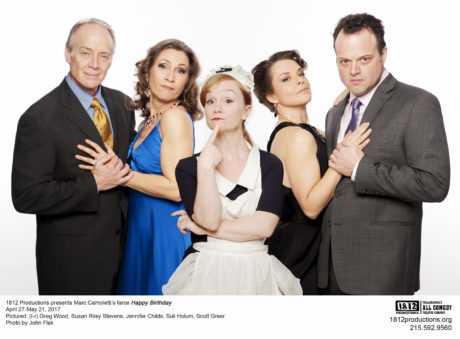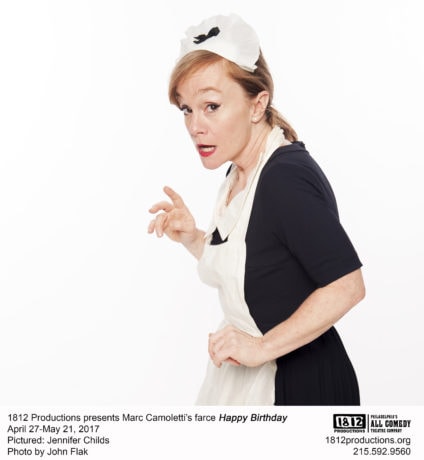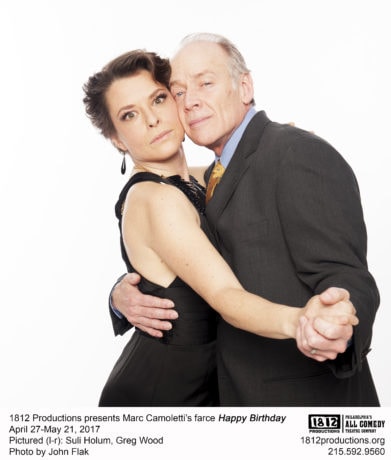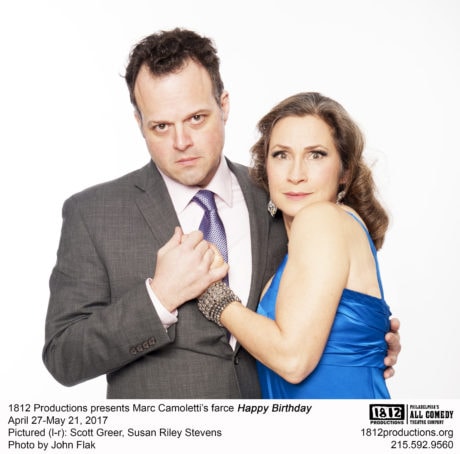Celebrating its 20th anniversary season, 1812 Productions – Philadelphia’s all-comedy theater company – is now in rehearsals for its springtime offering, the local premiere of French playwright Marc Camoletti’s Happy Birthday. Adapted by British writer Beverly Cross, the rollicking door-slammer farce was a long-running hit in London, which Camoletti soon followed with Don’t Dress for Dinner, another version of the same theme.
Set at a country house in the UK in 1983, 1812’s production – starring Greg Wood, Susan Riley Stevens, Scott Greer, Jennifer Childs, and Suli Holum, and directed by Trey Lyford – brings together three real-life couples (Wood and Stevens, Greer and Childs, Holum and Lyford) for a raucous fast-paced evening about marriage, infidelity, social class, and mistaken identity. I was invited to watch an early rehearsal for the show, and afterwards, to conduct a high-spirited interview with the terrific team. I can guarantee that Happy Birthday, if it’s even half as funny and lively as our conversation, will be a sure-fire hit and one you won’t want to miss.
Deb: So, how many doors do you slam?
Greg: Six, at least.
Jen: Five slamming doors and one flippy door.
Trey: We told the set designer how many doors we needed, and we also made it clear that they would have to be strong enough to handle all the slamming. It’s like a rhythm. As far as how many doors each character slams individually, we’re not sure, we haven’t gotten that far yet in rehearsal.
This is the Philadelphia premiere of Happy Birthday. Is that why you chose it, instead of the more familiar iteration of the theme in Don’t Dress for Dinner?
Jen: Honestly, I just like this one better. I read both, and this one has a more British sensibility. It’s basically the same group of characters, with some different names and a sixth character in the other, but for me, this one just worked better and was funnier. Plus I liked the title for our 20th anniversary, so we could say “Happy Birthday” to ourselves! Neither of us knew it, but we recently found out that Lantern Theater Company scheduled Don’t Dress for Dinner for next season, so Philadelphia audiences will get to see both shows.
Will the design and characterizations be the same as in the typical British farce, with a two-level set and English accents?
Jen: It’s an interesting construct for this farce, in that it all takes place in one room in a country house. So we not only have all of the doors on the same level, but we also have the dining room table set up in the living room. The fact that the space is smaller makes it more comic; it’s hard to avoid each other.
Trey: It wasn’t a consideration to do a two-level set. Camoletti didn’t use one in his script, and he didn’t for Boeing-Boeing either. We considered dropping the accents, but the story is so British that the pomposity is right.
Scott: The people in this are getting caught up in inventing lies and justifications; they are thrust into that role because of the fast timing and close contact. They don’t have time to understand what’s going on, but they’re accused and told by each other, “You’re doing this now,” so they are forced to make up explanations on the spot.
Trey: The center of their space becomes a real hot spot! What was a glass tabletop is now plexi, but the cast is all so skilled and follow the blocking so well, that it really isn’t a problem. And the group interactions are so good, it’s been a great collaboration on how to stage it and how to make it interesting.
Yes, I just saw that in the rehearsal, with all of the cast members contributing their ideas. What do you love most about the genre of British farce?
Jen: Well, this one is actually French, with a British adaptation, but in either case, I never tire of watching the aristocracy act foolish, and British actors like John Cleese have taken it to a level that is so high and full.
Scott: The thing about class is so major in British and French society. Social class is so important.
Greg: It’s like watching a train wreck! You see it coming, but you can’t stop it, and you can’t stop looking at it.
Susie: The effort to keep things together when everything is falling apart is such a funny dilemma.
Jen: And the extreme we’re allowed to go to in a farce is what we’d all like to do if it were socially acceptable. When my daughter Lily was a baby and she screamed, I remember thinking that I wished I could do that too. In a farce we can, everybody lets loose and screams.
Trey: What makes Happy Birthday so French, though, is that it’s not just a social farce, it’s a sex farce, too. The little titillation is fun to watch, especially in England, where it was translated.
Scott: Sex is always fun and daring and titillating.
Trey: In this you get a sense of tight social ethics embracing naughty ethics. When we looked at staging it here, we had to figure out how do you keep that? So we thought of the punk rebellion of the ‘80s, and decided to set our production in 1983, during the era of Margaret Thatcher in the UK, and Ronald Reagan in the US. It was a time that inspired a very radical counter-culture.
Suli: But it’s like Greek drama, in that all the violence happens off-stage. As we see with the sex in Happy Birthday, in the end nothing really happens on stage, in view, but they talk about it and question each other throughout the entire show.
Trey: The question here is at what point do you just let go and forget about social propriety? What’s your gateway to “fuck it”?
Greg: [In an announcer’s voice] Norwegian River Cruises: Your Gateway to “Fuck It.”
When and how did the idea for this production come about? Did you want to do the play, and then after selecting it, decided on couples casting, or did you want to find a vehicle to feature all of you, and then decided on this particular one?
Jen: That’s an excellent question. This is our 20th anniversary season, so I wanted to cast certain people who’ve been working with us at 1812 for a long time, like Scott and Susie. I’ve also had the idea for a while for the four of us – Susie and Greg, Scott and me – to do something together. I knew this particular play needed a director with both theater and clown chops, to open us up to a larger physicality, so I thought of Trey, since I’d seen him and Suli perform many times. So we were fortunate to have another couple to work with us on this.
Greg: Yes, and it’s fortunate that no one is bringing in baggage; we’re all happily married!
What are the positive and negative aspects of working with your spouse in a show on this subject?
Greg: None.
Scott: It’s interesting, there’s a lot of fun in acting with other couples and watching their dynamics. When I see the relationship of the characters Greg and Suli play, a married couple, I think, “Oh, God, they do that, too?”
Greg: The friendships we’ve had allow us to bypass all of the initial stuff a cast usually has to go through, getting to know each other; we could cut right to the chase.
Suli: We can all make fools of ourselves!
Trey: And the couples police each other, so no one else has to call them out – their spouses do!
Jen: It’s integral to the play. When you’re married for so long, you have to be careful how you say something as simple as “Can you shut the door?” It means so much more and can hold so much more weight, depending on how you say it!
Trey: It’s a balancing act with the tone of voice. Depending on the tone, reactions are different, and a spouse is much more sensitive to that.
Scott: I’ve taken for granted how healthy our marriages are!
Greg: Susie was so sick one day, so I thought I’d just edge around her in a scene. And she said, “I don’t think our relationship is like that.”
Susie: Micro-directing under my breath.
Suli: Another important thing that all three couples have in common is that we each have a daughter, so we all do the same thing during breaks, we all check in at the same time. So there’s that understanding with us, too.
Why is it important to you, and for the public, to do a play about marriage, infidelity, and betrayal? What’s so funny about that?
Greg: Oh, it’s always fun watching other people suffer, when you’re not the one feeling the pain. As Mel Brooks said,
Jen: “Tragedy is when I cut my finger. Comedy is when you fall into an open sewer and die.”
Trey: There’s so much tension in our country now, at first I did question why are we doing this? But because there’s so much going on, it’s good to have comedy in the world, and to joke about our fear of cheating.
Suli: It’s so common, and few things are taboo in our culture, but infidelity is one of those things that people don’t talk about. Most couples have issues; for example, everybody thinks their spouse talks too much. So even for people who haven’t gone through infidelity, there are other issues that they can relate to in their marriage, that are funny when you see other couples on stage who feel the same way and argue about the same things, but to the extreme.
Jen: Extremity of reaction is outrageous, and that’s what happens in this play. There are so many questions and suspicions, that the explanations and lies keep building – like in the world today.
Trey: “I don’t know what’s true anymore!” It’s a theme that really plays well in current times.
Scott: “Everyone in the whole world is a cheat!”
Greg: We thought maybe we should put in a quote about “false news.”
Scott: In Rizzo, which we did first with Theatre Exile in 2015, and then with Philadelphia Theatre Company in 2016, during the presidential campaign, we did put in a line like that, where I said, “I’m gonna make Philadelphia great again.” It got a huge reaction from the audience at every performance.
Susie: We just did something similar in Marcus/Emma at InterAct, a fantasia on Marcus Garvey and Emma Goldman: “We’re going to build a wall.” And the audience got it.
Since you set Happy Birthday in England in 1983, is this strictly a piece about that period, or do you see parallels with our current time in the US?
Jen: I think it’s not. We chose to set it in ’83, though it was written in the ‘70s, because there are parallels. The ‘80s were very much a “me” time, and class distinctions were vast, with Reagan here and Thatcher there. Excess was celebrated, in shows like Dallas and Dynasty; pretending to be something greater or more than you are. Then punk rock pulled the rug out.
Trey: The attitude was “I’m so awesome, I can wear this pink shirt.” It was a fun time to live in, a fun time in fashion. And sex was cool.
Greg: Everybody was hooking up.
Trey: There’s a rhythm with the times. Now it’s the selfie, so it’s very relevant. “Me” is at home in the ‘80s, and it is again today.
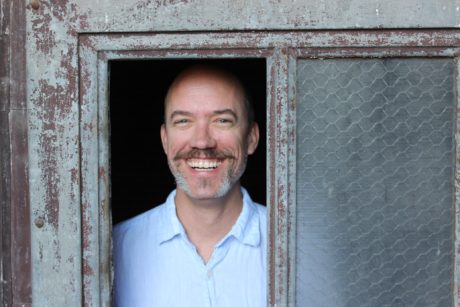
How do you view your characters? Do they share any personality traits with you, or with people you know?
Greg: Any actor, I think, bases a character somewhat on who you are, to make it more real. The ultimate fallback you have – not necessarily as a safety net – is yourself.
Suli: For me and my background, the characterization was about clowning. What’s really funny is not what you think is funny, but what you feel is risky. You have to be in a ‘trembly’ place, and people will laugh.
Trey: The casting for this is spectacular. Everyone is so exactly on with the psychology and rhythm of the characters; they resonate with each other.
Susie: That’s a hard question for me, because the farther I got into my character’s reality, the more completely real she seemed to be, particularly for a farce. It’s not my job to see the humor in what she does, but to understand her and why she does what she does.
Jen: I absolutely agree. Our characters’ relationships are the exact opposite of Scott’s and mine. Usually he’s the funny one, and I want him to be quiet – the reverse of what goes on in the play.
Scott: The characters react to what they’re told, and what they are led to believe; they’re dictated by reaction.
Trey: Farce in general is equivalent to a non-proactive world.
Scott: Things happen to set off all the lies.
Jen: And that made it difficult to learn the lines, because they’re all responses to responses to responses.
Scott: “Why am I lying about this? Who do I think I’m talking to?”
Trey: Trying to keep it straight in their heads.
Scott: You lose track.
Suli: The more confused you get, the more you get into the lies.
Greg: It’s exhausting!
Scott: Yes, our brains and bodies hurt.
Greg: And you can’t ease your way in; there’s no quiet moment.
Scott: If there’s a pause, it’s like a taking a breath after extreme trauma. It starts at go!
Greg: And goes to the end.
After all the non-stop energy you’re exerting in Happy Birthday, do you get a little bit of a summer break, or do you have other shows coming up soon?
Greg: I’ll be returning to the Pennsylvania Shakespeare Festival this summer in The Hound of the Baskervilles opening in June, and then Susie and I will both be in Troilus and Cressida in their “Extreme Shakespeare” production, so she won’t be moving out with me to the DeSales campus till late July. For that one, the actors learn our lines on our own, then come in together to rehearse on our own, with no director or designers, the way it would have been done in Shakespeare’s time.
Susie: Yes, Troilus and Cressida is only four days of rehearsal, so I’ll come later with our daughter Laura and just stay through the end of the run.
Scott: I start rehearsals for How to Use a Knife at InterAct, with Seth Rozin directing, the day before we open Happy Birthday. Previews begin right after this closes.
Jen: I’ll be at Montgomery Theater for two weeks in July for On the Road Again with Tony Braithwaite. Then for the rest of the summer I’ll be doing a lot of Artistic Directing for 1812.
Trey: Suli and I will be going to Norway with our Jo Strømgren Kompani production of A Doll’s House. We were there last year, and it’s really exciting to bring Ibsen back to Oslo on a national stage – it makes me freeze for a moment! Then we’ll be getting settled here; we’re moving back to Philadelphia.
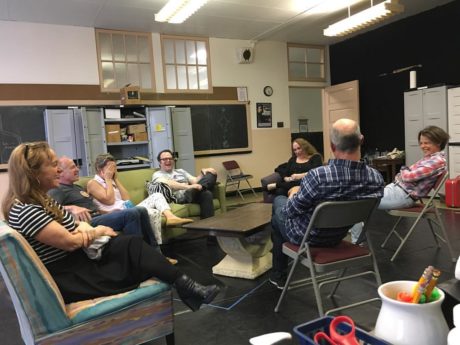
Is there anything else you’d like our readers to know before we go?
Jen: Happy Birthday is really funny!
Trey: And we’ve really enjoyed watching each other in it.
Thanks to all of you for a sneak peek at the show and a lot of laughter in the room!
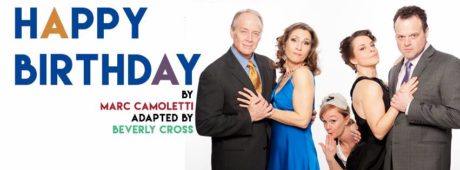
Happy Birthday plays Thursday, April 27, through Sunday, May 21, 2017, at 1812 Productions, performing at Plays & Players Theatre – 1714 Delancey Street, Philadelphia, PA. For tickets, call the box office at (215) 592-9560, or purchase them online.


